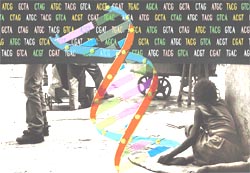Environment, genes and mutations
Environment, genes and mutations

Two institutions in the us are working to comprehend how contaminants, toxic chemicals and other environmental factors affect the human genome. The Environment Genome Project (egp), sponsored by the National Institute of Environmental Health Sciences (niehs) , based at North Carolina, us, is studying variations of certain types of genes and their interaction with the environment. The National Centre for Toxicogenomics (nct), which began work in December 2000, also funded by the niehs, is studying how the proteins produced by the genes interact and respond to environmental exposures during different stages of health and diseases.
Interaction with elements of the environment can alter human genes, forcing transformation of proteins produced by the genes. This can be favourable or detrimental to health. Particulate matter in the air, complex chemical compounds, exposure to uv light, pesticides in the food and other contaminants that we suffer daily can mutate our genes. Toxicogenomics helsp track the response of thousands of genes to toxic chemicals present in the environment.
The varied responses of genes under similar circumstances are there for all to see. If you are a smoker and you don't have cancer, you maybe of the lucky ones with a gene inside you valiantly fighting the environmental toxins that can induce cancer. Simply said, your genes are may be making you pollution resistant. A gene is very much like a computer programme designed to carry out particular functions. Just as voltage fluctuations or virus can corrupt computer programmes, certain chemicals, drugs, viruses or pollutants in the air we breathe can lead to mutations in genes or corrupt their functioning. The genes then behave like a damaged computer programme. But unlike a corrupted computer programme the gene mutation might not always be harmful. Some Asians possess a gene that helps them process Sarin, the deadly nerve gas, into a harmless compound And at other times, gene mutation may trigger the body's defence mechanism against healthy cells, destroying tissues like cartilage, causing disases such as rheumatoid arthritis.
The projects Together, egp and nct aim to find answers to puzzles such as why some people develop cancer upon exposure to a carcinogen while others do not. Scientists have identified some 500 genes that are responsive to environmental factors like the content of the air we breathe. The egp is looking especially at two categories of genes







